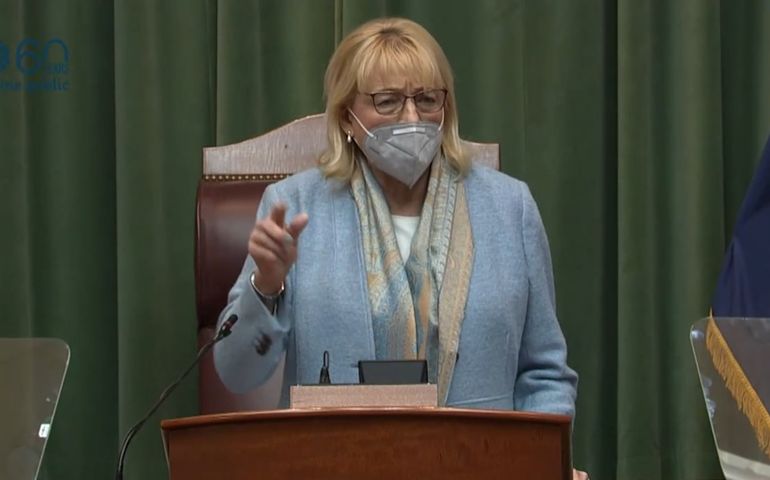Mills proposes returning $411M to taxpayers, high-speed internet for all by 2024
 Screenshot / Maine Public
Gov. Janet Mills gave her second State of the State address, and the first since 2020, on Thursday evening in Augusta.
Screenshot / Maine Public
Gov. Janet Mills gave her second State of the State address, and the first since 2020, on Thursday evening in Augusta.
Gov. Janet Mills on Thursday called for returning $411 million from Maine's projected budget surplus to taxpayers, along with several measures to bolster the state's economy and workforce. Proposals include statewide high-speed internet access by 2024 and two years of free community college.
"A global pandemic has had very real and very clear impacts on the national economy, and those impacts are felt right here in Maine," including higher grocery store prices and even a scarcity of chocolate milk in Houlton and Moxie soda in Lisbon, Mills told lawmakers in her second State of the State address since taking office and first since 2020.
"While I cannot control the impact of COVID-19 on global markets, I can make sure that we deliver to Maine people the resources they need to grapple with these rising costs as we build a stronger sustainable economy that is more resilient to the rest of the world."
Mills, a Democrat expected to run for reelection this year, claimed bipartisan support for returning half of the $822 million budget surplus to Mainers, noting that the idea is viewed favorably by Republican lawmakers Jeff Timberlake, Senate minority leader, and Sawin Millett, the top Republican on the House budget committee. The refund is to be distributed to an estimated 800,000 taxpayers.
While lawmakers on both side of the aisle welcomed returning money to taxpayers, Republicans were noticeably silent when Mills unveiled her plan to make community college free for two years. In a televised interview with Maine Public afterward, House Minority Leader Kathleen Dillingham said she's keen to learn more about how the free tuition plan will be funded.
Pointing to Maine's workforce shortage as the largest barrier to sustained growth, Mills also proposed a series of measures from student debt relief and higher pay for child care workers to bringing high-speed broadband to all those who want it by 2024.
"Another thing keeping too many people from working, especially in rural areas of Maine, is the lack of affordable broadband," she said. "High internet is no longer a luxury. It is a basic necessity, as fundamental as electricity, heat and water."
Without elaborating on the broadband expansion plan details, she said, "We will make Maine one of the most competitive and desirable places to live and work and raise a family and stay connected to the world."
Higher education
In a move to help high school graduates most affected by the pandemic, Mills proposed making two years of community college free. She also told those currently enrolled that the state has "got your back, too," and will cover every last dollar of their second year.
"There are so many good-paying jobs in health care, engineering, the trades, construction, in clean energy, technology and many other industries that are just waiting for you — and, as your governor, I want you to know the future is yours and we will help you embrace it."
Mills is scheduled to promote the free-tuition plan at a visit today to Central Community College in Auburn, where she will to tour a Building Construction program classroom.
"We want to welcome back those students who got knocked off course by the pandemic," Maine Community College President David Daigler said in an e-mailed statement after the speech. "Free community college is a game-changer for those students, and for Maine families who want their children to have the strongest start possible in building a better life."
To ease the burden on indebted students, Mills proposed an overhaul of the Opportunity Maine Tax Credit to make students eligible for up to $25,000 in debt relief over the course of their lifetime, so long as they have a job and make Maine their home.
"With these changes," she said, "the Opportunity Maine Tax Credit will be the leading student debt relief program in the nation and a powerful tool for employees to draw people from all walks of life to live and work in the state of Maine."
Among other workforce measures, Mills said she supports House Speaker Ryan Fecteau's proposal to provide pay increases for child care workers, and said her supplemental budget will include more than $12 million to help make that happen.
Wrapping up with an upbeat note, Mills said, "Our state is beautiful. The state of our state is strong, and it is growing stronger."
Mainebiz web partners
The governor said the bill to give money back to the taxpayers has bi-partisan support but fails to say the suggestion and idea came from a republican representative. And when the state sent $285 to each person who worked during the pandemic, nobody mentioned that the republicans tried to get larger payments to workers but the democrats would only agree to $285 per worker. Know the facts before you vote in November!!













1 Comments